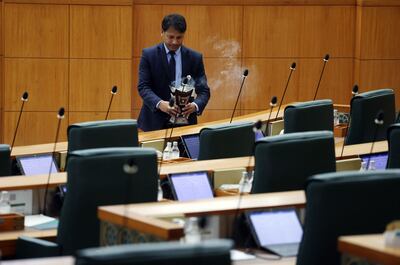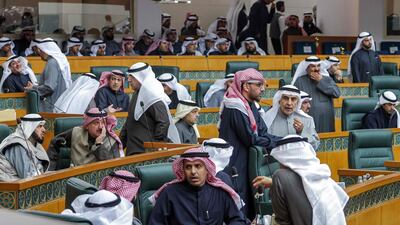Several Kuwaiti MPs have issued a call for the government to “follow the constitutional path” in dealing with parliamentary proposals and decisions, after a withdrawal and boycott of this week’s National Assembly session.
The government boycotted Wednesday's parliament session, a day after two cabinet ministers walked out of the chamber, saying it was not allowed to express its opinions regarding draft economic bills.
MP Hamad Al Obaid said it was the government's first priority to attend Wednesday’s session and express its opinion on the matter, deliberate with parliament and vote on the motion.
Tensions rose surrounding one bill in particular, a draft calling on the government to take over outstanding consumer and personal loans of Kuwaiti citizens with an estimated value of several billion dinars.
Mr Al Obaid released a statement on Thursday, addressing Prime Minister, Sheikh Ahmed Nawaf Al Sabah.
“Your Highness, the Prime Minister, whoever referred to you the idea of withdrawing [from parliament] has implicated you, and whoever drafted this statement for you has also implicated you. The text of Article 50 of the regulations stipulates the government to attend the session.” Article 50 of Kuwait's constitution calls for co-operation between branches of government.
The Prime Minister convened an emergency cabinet meeting on Wednesday, in which ministers reviewed several decisions after the government's withdrawal from Tuesday’s session and its decision not to attend the following day.
The government said it had not been given a chance to study two reports prepared by the specialised financial committee before it could address the issued raised in front of parliament.

Mr Al Obaid said “it will be a good opportunity to form a rescue government with strong ministers” should the government decide to resign.
Another MP, Adel Al Damkhi, warned the government that its recent boycott was a reflection of past administrations and dissolved parliaments which have led to political deadlock, he said, delaying much-needed economic reforms.
“This is an approach that we have known only from governments that have failed and caused the country’s destruction in the previous period,” Mr Al Damkhi said. "We do not want this government to be on this same approach."
Jenan Bushehri, one of two women elected to the current parliament, said the questioning of Minister of State for Cabinet Affairs, Barak Al Shaitan, was long overdue.
“As long as the government acknowledges the course of the National Assembly session ... while ministers prefer to defend their interests and neglect the political and economic interests of the country and the citizens’ livelihood, it has become a constitutional entitlement to question the Minister of State for Cabinet Affairs,” she said in a statement.
The current crisis is reminiscent of past political disputes that led to the dissolution of the previous parliament and cabinet led by former prime minister Sheikh Sabah Khaled Al Sabah.
The previous government faced several months of political feuding and tension with the country's National Assembly over allegations of corruption.


